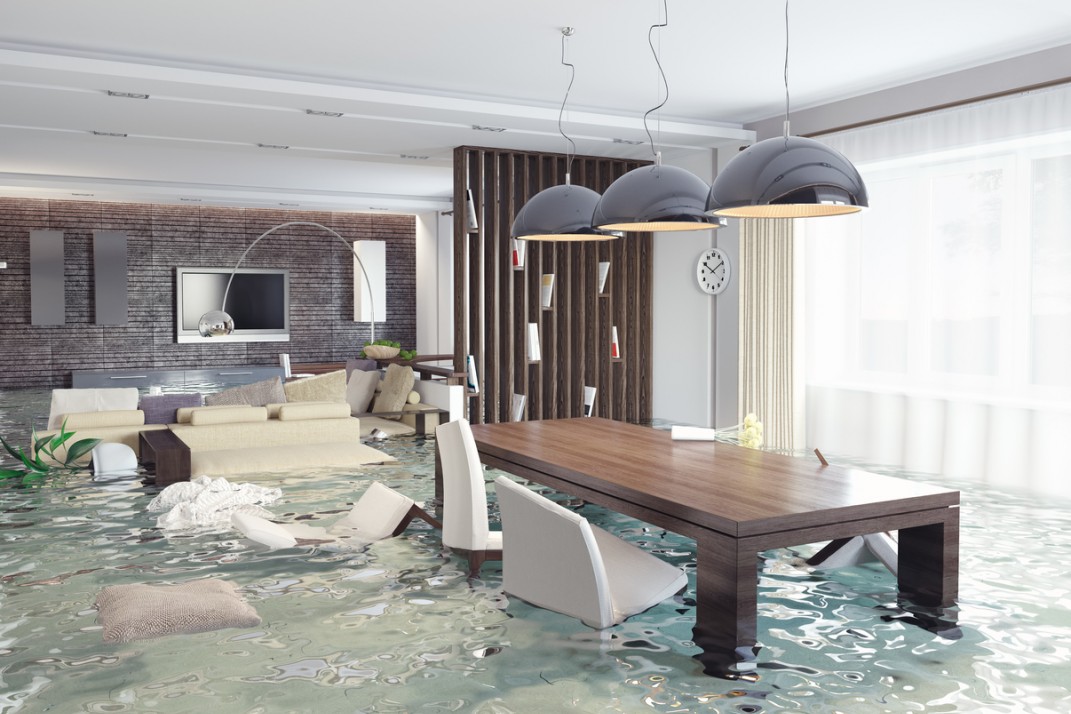Raise your hand if you were affected by last week’s flood, and if your property was damaged?
Wait. I can’t see your hands.
You must be submerged in eight feet of water…
As soon as that rain started pouring down, all I could think of was, “Sooooo many people are going to wake up unhappy tomorrow.”
It happens more than you might think. And no matter what your own personal pet peeve is, regarding houses or condos, I can tell you unequivocally that water does more damage to homes than anything else out there. A tree falling on your house sucks, but it’s rare. A raccoon tearing up your backyard is frustrating, but it’s not quantifiable damage. A ghost haunting your house is nightmare-inducing, but it’s make-believe, and unless you pay for therapy, water is still numero-uno on this list.
I received a call last week from a client who had sold her condo about six weeks ago, which is scheduled to close this week.
Low and behold, she told me that there was a leak in the unit above her, the water has come down into her unit, and while the insurance company is going to pay for it, she needs to know what we should do before the upcoming closing.
First and foremost: disclose.
Disclose this to the buyer and his or her agent at the earliest opportunity, which I did, immediately after speaking to my client.
There is a clause in the standard Agreement of Purchase & Sale that deals with what we in the industry refer to as “catastrophic events,” but as is often the case, our verbiage is different from the verbiage actually in the clause.
The Standard Agreement of Purchase & sale contains this section:
14. INSURANCE: All buildings on the property and all other things being purchased shall remain until completion at the risk of the Seller. Pending completion, Seller shall hold all insurance policies, if any, and the proceeds thereof in trust for the parties as their interests may appear and in the event of substantial damage, Buyer may either terminate this Agreement and have all monies paid returned without interest or deduction or else take the proceeds of any insurance and complete the purchase.
Note the term “substantial damage.”
Over the years, the courts have worked to determine, in cases that obviously can’t be resolved between the buyer and seller, what “substantial damage” is. As with most of the law, this is a massive grey area. I have always told clients that the damage need be “catastrophic,” since any seller would have a hard time relinquishing a a pending completion of a transaction, in the event that, say, a window broke, or a tree fell on a shed in the backyard.
If a buyer paid $1,500,000 for a detached house in Bloor West Village, there was a fire, and the house burned to the ground, I think even the seller would agree that this damage is catastrophic, and meets the criteria of “substantial damage” as per the APS.
Where things get murky is when the buyer and seller disagree, but the cost and fear of litigation usually allows parties to come to an agreement.
In the case of my seller-client with a few damaged hardwood floorboards, the good news is – the insurance is paying for all new flooring! The buyer just won a small lottery, albeit one he has to wait a couple of weeks for. But provided the terms of the insurance claim, timing, and promise of workmanship and specific performance are agreeable to both buyer and seller, there’s no issue here.
Where I did find an issue was with respect to another condo owner who had damage not in her own unit, but the units below her.
Her condo comes with a much-sought-after 220 square foot terrace, which is open air, with nothing above it.
Somehow or another, the substantial rain last week didn’t drain properly on the terrace, and leaked down into the unit below her.
But get this: the condominium corporation told her that it’s covered under her insurance policy, and if it’s not, the damage is up to her to remedy.
This is when I just about blew my lid.
We can debate this later on if you’d like, but my initial reaction, and my follow-up research, tells me that this is incorrect.
First and foremost, consider that a terrace isn’t owned, but rather is, by definition, “exclusive use, common elements.”
Whether you realize it or not, you don’t own your balcony, patio, or terrace. You own what’s inside your unit, and every condominium corporation has a Declaration that specifies the exact boundaries of every single unit. No outdoor space is owned.
So if the outdoor space isn’t owned, then how can it be insured by the unit-owner?
More to the point, how can the condominium corporation claim that the space is exclusive use common elements, but then claim that the unit owner has a responsibility and/or liability over that space?
I suppose what that responsibility is, would ultimately determine who is liable in this case: the unit owner or the condominium corporation.
I have a copy of the Status Certificate, and the Declaration for this building.
Note the following section pertaining to common elements:
ARTICLE V – COMMON ELEMENTS
No alteration, work, repairs, decoration, painting, maintenance, structure, fence, screen, hedge or erection of any kind shall be performed, done, erected or planted within or in relation to the common elements (including any part thereof over which any owner has exclusive use), except by the Corporation or with its prior written consent.
So the unit owners are not allowed to conduct “repairs” on the common elements, including exclusive use common elements, except with the Corporation’s prior written consent.
It seems to me, the Corporation doesn’t want, and isn’t permitting owners to, work on the common elements space.
To claim that an owner can’t make “repairs” or conduct “maintenance” on the space on the one hand, but then call them liable for flood damage on the other hand, is somewhat hypocritical.
Thankfully for us, the very next article in the Declaration refers to exactly that – maintenance and repairs!
ARTICLE VI – MAINTENANCE AND REPAIRS
Save and except for the Commercial Units, the Corporation shall repair and maintain the common elements and shall repair and maintain all doors which provide means of ingress to and egress from a unit, and all windows, save for and except maintenance of interior surfaces of windows and doors providing ingress to and egress from a unit, whether such doors and windows are part of a unit or part of the common elements.
So except for doors and windows, the Condominium Corporation is responsible for repairs and maintenance.
Got it.
Now wherein the Declaration would it state something about the unit owner being liable for anything pertaining to the common elements?
The only mention I can find is this:
Each owner from time to time shall forthwith reimburse the Corporation for repairs and replacements to windows and doors serving his unit, and to exclusive use common elements areas and for repairs to any part of the common elements caused by his neglect or intentional misconduct.
“Neglect or misconduct.”
Here’s where things get interesting.
This flood that took place last week, with water not properly draining from the exclusive use common elements “terrace,” and dripping down into the units below, is not the first flood.
In fact, it’s apparently the third.
So what we clearly have here is an ongoing issue on the common elements, perhaps due to a construction defect or a breakdown over time. The fact that multiple terraces leaked tells me this is the former – an issue with the construction of the terraces, and something that would fall upon the Corporation to remedy.
And by the way – the Corporation does have insurance for the common elements.
ARTICLE VIII – INSURANCE
Section 1 (a) (i) common elements;
So after reading through about forty pages worth of the Declaration, and understanding what happened out on my client’s terrace, I’m utterly confused as to how the Condominium Corporation can not only claim that the unit owner has to go through their own insurance (for which they’re not insured), but that the damage is the liability of the unit owner.
I told my client to go on the offensive.
Not only should she demand that the Corporation pay for the damage, but she, and the other unit owners on this floor, should demand that the Corporation assess, and fix the problem that clearly exists out on the terrace.
I’m not a real estate lawyer, but I think this one is cut and dry.
Of course, I asked a friend of mine who is a lawyer, and she said, “You have a real big grey area there.”
No kidding.
What else is new…
































Professional Shanker
at 10:24 am
Had a similar issue in a condo building I used to live in – water (with some type of chemicals in it, possibly just dirty oxided water) from a storm pipe above my parking spot leaked onto my front hood and caused discoloration on my brand new truck, it was very noticeable. Given that it was a common element I went to the Condo corp and they proclaimed the same thing that I would have to put it through my insurance, not their problem. I called BS on them and told them if they didn’t pay up I would be taking them to small claims court. Long process ensued, 6 months later and they eventually paid up, after the BOD agreed to pay it. That said it was only like $2,500. Funny thing is it happened again a year later and they paid up once more after going through the same process, eventually they did enough work to seal the pipe properly. I argued that it was on them to maintain the common elements, that is what my and all other condo owners pay our maintenance fees for, they disagreed and never admitted fault. I also had to sign a release both times which I went back and forth on wording a fair bit. I think your clients would be best advised to go directly to the BOD, see if it can be resolved out of court, although I was very interested to see how it would be adjudicated in SCC.
GinaTO
at 10:41 am
David – out of topic for your post, but about the Rebecca St. house on your Pick5 – check the comments on The Mash for that house – someone linked to a copy of the house inspection. Oooch, it hurts. Lots of hidden (and no-so-hidden) issues there. I also remember from a previous Mash posting that there were heating and cooling issues.
Housing Bear
at 2:05 pm
“A ghost haunting your house is nightmare-inducing, but it’s make-believe, and unless you pay for therapy, water is still numero-uno on this list.”
Gold
Dan_pronounced_Dane
at 2:13 pm
Props to David! Seriously we need a book from you – like Kitchen Confidential… but for RE
Timmy
at 11:59 pm
Some are quite interesting in your Blog. Worth to read
Jimbo
at 10:58 pm
I need to play devils here. Before I do the second quote where they state they will take care of all repairs and maintenance sides with client.
You are not prohibited from repairing, you need to write to them requesting permission.
If you are not inspecting the common element are you being neglectful? If you inspect it and ask them to repair it then the flood happens it is on them otherwise you were neglectful unless you can prove it had been brought to their attention I suppose.
What if there was debris that could be cleaned that blocked proper drainage, is it maintenance to get rid of the debris or cleaning. If it is cleaning were you neglectful for not cleaning the debris.
I’m not even close to a lawyer but that is where I see this issue going
Tom Tyman
at 6:59 pm
Great post!
I’ve just started reading your blogs and I have to say that I’m both entertained and informed at the same time. Keep it up!
Armando
at 12:12 pm
We had a flood in our building this past weekend and to say the least we were very upset to wake up to water in our unit. We have had several floods in the building however, this is the first time we have dealt with IBX Services. There was alot of damage to our unit and the crew was fanatic and the project manager actually took the time to explain what her crew would be doing in our unit the next couple of days.
http://www.ibxservices.com
Thanks IBX for a great job!!!
Alice
at 5:06 am
Problem shared in this blog is common and we should have a proper knowledge of what to do in such a situation. Water damage is a serious problem and it needs to be handled on time and by a professional water restoration company so that the damage can be minimized. Identification of the problem is necessary for making a restoration plan, so it is best to hire professional for the job and consult your insurance company.
http://www.servprotauntonmansfield.com/water-damage-restoration
Rick Aurora
at 4:12 pm
very interesting blog
Our Agents
Vargas Anthony
at 2:45 am
Thanks for providing such useful information. Hope to get some more information in future also.
https://hurricaneclaimadjuster.com/water-damage-claims